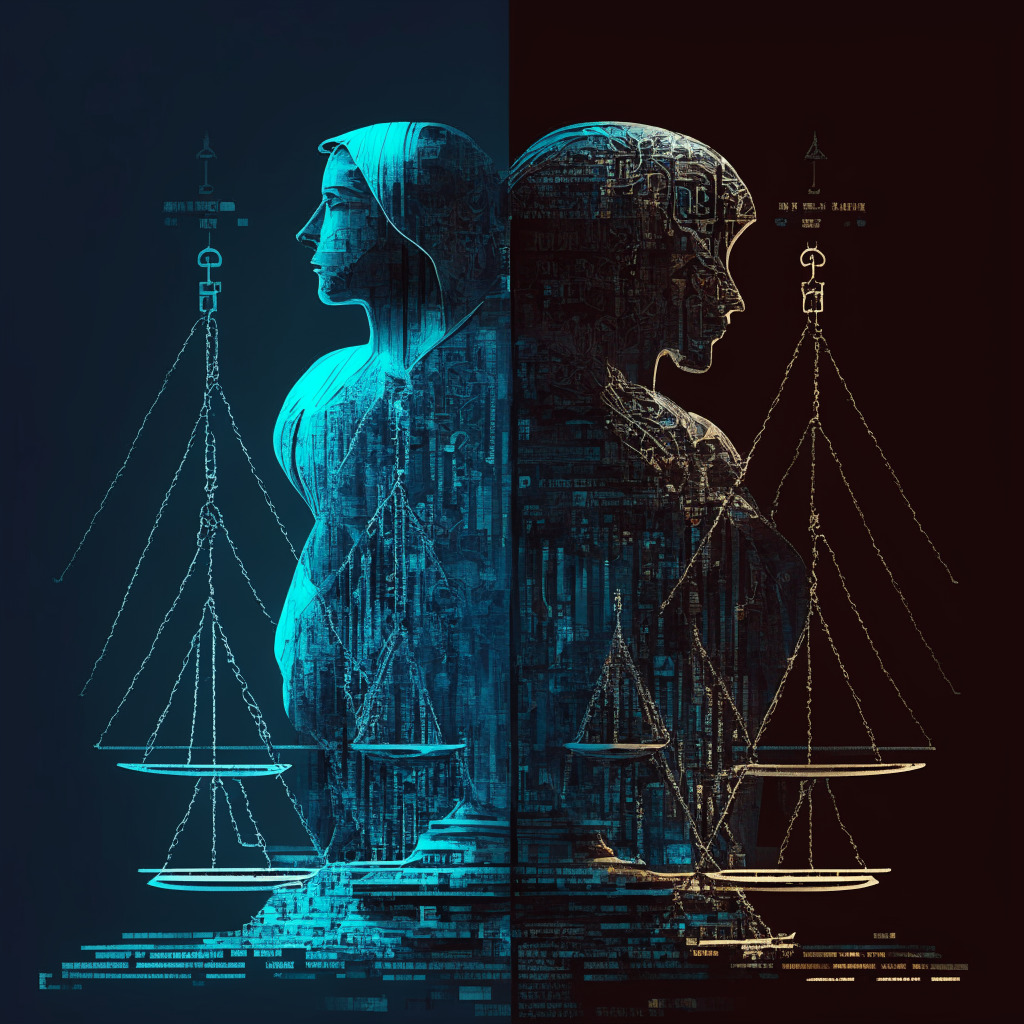Voyager Digital declares self-liquidation and ceases operations after failed acquisition deals with FTX US and Binance.US. Customers face a low recovery rate, while the bankruptcy raises questions about crypto investment stability and the need for stringent regulations to maintain investor trust.
Day: May 5, 2023
Binance Under Fire: US Justice Probe & Implications for Crypto Compliance Standards
The US Justice Department is investigating Binance Holdings Ltd., the world’s largest cryptocurrency exchange, over allegations of aiding Russians in evading US sanctions through crypto transactions. Binance is also facing scrutiny from the CFTC and the IRS for adherence to AML and KYC controls, raising concerns about the company’s ability to prevent unlawful activities.
Celsius Saga Nears Resolution: Exploring Challenges and Lessons in Crypto Lending Platforms
Celsius announces eligible users can withdraw remaining 6% of Distributable Custody Assets, allowing access to 100% of original funds after a 300-day freeze. This progress highlights the need for robust industry regulations and oversight to ensure safety and security of user assets in crypto lending platforms.
Argentina’s Central Bank Crypto Ban: Impact on Hyperinflation and Industry Growth
The Central Bank of Argentina has prohibited payment providers from facilitating crypto transactions to minimize the country’s payment system exposure to digital assets. This decision affects all coins and tokens in Argentina, potentially impacting the nation’s growing crypto industry amidst ongoing economic crisis and hyperinflation. Argentina’s fintech community remains skeptical about this stance.
US Labor Data Surge Boosts Crypto Markets: Analyzing Top Performers and Investment Risks
Recent favorable employment data from the US Bureau of Labor Statistics sparked a surge in the stock market and a minor rally in the crypto markets. Notable crypto performers include AI, FLOW, SPONGE, ICP, ECOTERRA, CSPR, and SWDTKN. Investors remain optimistic, but caution is advised when investing in volatile digital assets.
Balancing Decentralization & Regulation: Lessons from Aragon’s Discord Bans
The Aragon Association recently banned some members from their Discord platform, sparking debates about decentralized governance in the crypto community. The conflict highlights the complexities of applying crypto governance in real-world scenarios and finding the right balance between decentralization and regulation.
DeFi Security Breaches vs Liquid Staking Surge: Analyzing Risks and Rewards in Crypto
April’s decentralized finance (DeFi) hacks resulted in over $100 million in losses while liquid staking protocols surpassed decentralized exchanges (DEXs) in total value locked, signaling impressive changes within the DeFi space amid security concerns.
Cardano’s Future: Bulls vs Bears, On-chain Metrics and Diversifying with Presale Tokens
Cardano (ADA) stays in this week’s $0.38-$0.40ish range, as on-chain metrics show strength in the network. Despite being down 87% from its 2021 peaks, ADA’s ecosystem hosts high development and Decentralized Finance projects, attracting large investments. Diversification with emerging projects like Ecoterra offers a balanced, high-reward investment strategy for crypto enthusiasts.
RFK Jr. Challenges Biden’s Crypto Stance: Privacy, Taxation, and CBDC Concerns Unveiled
Robert F. Kennedy Jr. criticizes President Biden’s 30% tax on crypto mining and expresses concerns over government control on bank accounts and payment platforms. He opposes central bank digital currencies, arguing they could be used to subdue dissent by cutting off access to funds.
AI-Generated Art: Revolution, Originality, and Ethics in the Creative Landscape
AI-generated art is revolutionizing the world of artistic expression, introducing tools like Midjourney, Dall-E, and BlueWillow that foster artistic inclusion and enable artists to work more efficiently. However, concerns about originality, authorship, and ethical issues like copyright violations need to be addressed to ensure long-term trust and adoption within this emerging field.
Voyager Digital’s Asset Recovery: Liquidation vs Digital Reimbursement Debate
Crypto broker Voyager Digital focuses on returning assets to customers after failed deals with FTX US and Binance US. It plans to liquidate certain digital assets, while returning major cryptocurrencies at a 36% recovery rate. The uncertain regulatory climate and previous exposure to a failed crypto hedge fund contribute to the challenges faced by Voyager and the crypto industry.
Gala Games Token Upgrade: Coinbase’s Reluctance and Impact on GALA Holders
As Gala Games upgrades their GALA token on May 15 with improved features, Coinbase announced it won’t support the move, causing confusion for users. Gala V1 holders must withdraw tokens to ensure receipt of the new V2 token. Coinbase’s decision may be due to increased regulatory scrutiny, raising questions in the blockchain and crypto communities.
Apple’s Generative AI Research: Tackling Bias for a Blockchain Revolution
Apple’s research in addressing bias in generative AI models proposes a collaborative approach to dataset development, with potential impact on the global tech landscape, finance, and other industries, including fintech, cryptocurrency trading, and blockchain. Scalability remains a challenge.
Blockchain Battles: Security, Regulation, and Market Stability in the Crypto World
At a recent NYC gathering, blockchain enthusiasts and skeptics discussed security concerns, regulatory challenges, market volatility, and the future potential of the technology. High-profile figures like Elon Musk contributed, debating the fine line between fostering innovation and ensuring safety in the cryptocurrency space.
Crypto CEO’s Arrest Sparks Extradition Battle: TerraUSD Collapse and the Need for Regulation
Do Kwon, co-founder and former CEO of Terraform Labs, faces possible extradition to South Korea or the US after the collapse of Terra’s algorithmic stablecoin TerraUSD and Luna, leading to $40 billion vanishing from the crypto market. This high-profile case underlines the need for increased oversight and regulation within the crypto industry while raising questions about international cooperation in addressing complex financial crimes.
Unmasking FTX’s 9 Million Users: Striking a Balance Between Transparency and Security
Major media outlets request the release of 9 million FTX customers and creditors in a bankruptcy case to ensure legal transparency. However, the crypto community fears that the list’s exposure could make customers susceptible to scams, raising questions on striking a balance between transparency and user-data security.
Blend: Boon or Bane for NFT Lending? Exploring Opportunities and Risks in Crypto Lending
Blur’s launch of Blend, a peer-to-peer NFT lending platform, aims to introduce new buyers by lowering fiscal barriers for popular NFT collections. However, concerns arise over inexperienced collectors’ liquidity risks, potential market impact, and the platform’s ability to effectively protect lenders.
Digital Yuan’s Strides and Hurdles: Can CBDCs Rival Traditional Cryptocurrencies?
BNP Paribas and Bank of China’s recent partnership promotes the digital yuan to corporate clients, advancing blockchain technology and digital currencies. However, widespread adoption remains uncertain, as the public’s response to China’s central bank digital currency (CBDC) could impact its success in challenging traditional cryptocurrencies and fostering blockchain innovation.
Argentina’s Crypto Clampdown: Balancing Economic Protection vs. Financial Freedom
Argentina’s central bank bans payment platforms from offering cryptocurrencies, impacting companies like Ualá and Mercado Libre. Amidst high inflation, the clampdown aims to mitigate risks and protect customers, potentially limiting Argentinians seeking to safeguard savings amidst economic turmoil.
Reintroduction of Digital Asset Anti-Money Laundering Act: National Security vs Crypto Privacy
Sen. Elizabeth Warren plans to reintroduce the Digital Asset Anti-Money Laundering Act, aiming to curb money laundering and terrorist financing in crypto. The bill focuses on law enforcement and national security, extending KYC requirements and prohibiting transactions with digital asset mixers.
Legislation Impact: Will Crypto Firms Refunding Fraud Victims Boost Investor Confidence?
The New York Attorney General’s Office has proposed legislation to protect cryptocurrency investors from fraudulent activities by requiring crypto companies to adhere to specific standards and offer refunds to victims. This aims to increase consumer confidence and adoption of digital currencies.
NYC Blockchain Expansion: Embracing Opportunities, Tackling Challenges, and Shaping the Future
The blockchain and cryptocurrency space is rapidly expanding, with increased institutional participation and potential for mainstream adoption. However, security concerns, regulatory hurdles, and environmental implications present challenges that must be addressed for a sustainable and widely embraced future.
Extradition Battle Over Terra Co-Founder: Seeking Justice or Legal Complexity?
South Korean authorities seek extradition of Terraform Labs co-founder Do Kwon for alleged crimes in TerraUSD and LUNA token collapses. Montenegrin decision weighs factors like severity, location, and time, while considering the rights and interests of multiple parties.
Banking Crisis Impact on Bitcoin: Analyzing PacWest Bancorp’s Decline and Oil Prices
In the recent episode of Macro Markets, crypto analyst Marcel Pechman discussed the ongoing banking crisis and its potential impact on the cryptocurrency market, highlighting PacWest Bancorp’s 50% price decline as a primary concern. The rising interest rates might negatively affect Bitcoin, but eventually leading to positive outcomes for it.
Blockchain vs. Central Banking: Finding Clarity Amid Economic Ambiguity & The Human Element
The recent ambiguous messaging from the Federal Reserve has left markets craving clarity in policy-setting, highlighting the potential benefits of replacing human institutions with decentralized cryptographic monetary systems like Bitcoin. However, the complexity of the global economy demands flexibility and uncertainty in decision-making, still requiring a human touch. Policymakers should consider utilizing blockchain technology and cryptographic verification systems to provide critical clarity, transparency, and trust in the financial system.
Coinbase Q1 Results Surge Amidst Regulatory Concerns: Market Optimism vs. Uncertainty
Coinbase shares surge after exceeding Q1 expectations, but market experts express mixed opinions. Devin Ryan of JMP Securities remains optimistic, while JPMorgan maintains a neutral rating due to volume pressure and a declining USDC market. Goldman Sachs highlights the “highly uncertain” regulatory landscape as a significant concern, maintaining a sell rating on shares.
Dwindling US Financial System Confidence Boosts Bitcoin: Can It Break $31,000 Barrier?
Concerns over the U.S. financial system have led to increased interest in cryptocurrencies like Bitcoin, which has maintained strength near its critical $31,000 resistance. Investors are viewing Bitcoin as a safe haven alongside gold, as top-10 cryptocurrencies continue to exhibit conflicts between bulls and bears, impacting future market trends.
UK’s FCA Crypto ATM Crackdown: Balancing Innovation and Consumer Protection
The UK’s Financial Conduct Authority (FCA) is cracking down on illegal cryptocurrency ATMs, raising concerns about regulatory oversight in the crypto space. These efforts reflect the growing global push for crypto regulation to protect users from scams and money laundering, while balancing the need for innovation and mainstream adoption of cryptocurrencies.
Exploring BRC-20 Tokens: Innovation and Caution on the Bitcoin Blockchain
The Bitcoin blockchain explores new potential with BRC-20 tokens, leveraging the Taproot upgrade features. However, due to their experimental nature, compatibility limitations, and the lack of DeFi capabilities, experts urge caution for speculators seeking short-term gains.
Blockchain Future: Balancing Potential Benefits and Challenges in a Decentralized World
Blockchain technology offers exciting possibilities for a more decentralized and transparent future, with potential to impact various industries. However, there are concerns over scalability, energy consumption, and vulnerability to cyberattacks. Both enthusiasts and skeptics must engage in open dialogue to understand its potential and limitations.
Alibaba’s Metaverse Launchpad and Web3’s Impact on Mainstream Industries: Embracing or Warning?
Major Web2 players, including Alibaba and Sports Illustrated, are entering the Web3 space, launching metaverse and NFT platforms on blockchains like Avalanche and Polygon, signaling growing interest and integration of Web3 technology into mainstream experiences.
Uncovering Hidden Gems: Web3, Metaverse, and the Importance of Early Trend Spotters
With Web3 and the metaverse gaining traction, recognizing early catalysts and lesser-known impactful projects is essential. Enthusiasts and investors should pay attention to whispers and murmurs, potentially leading to the next major development in blockchain and the metaverse.































